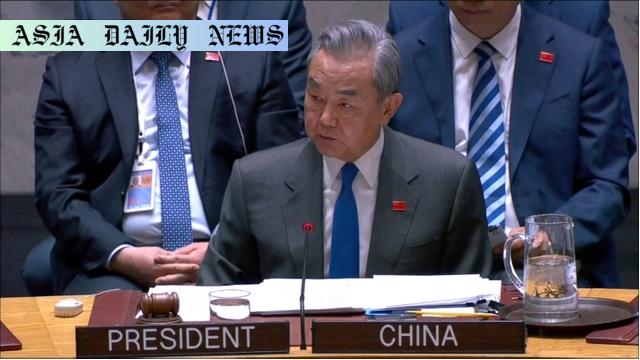China UN engagement: Beijing backs multilateralism, emphasizing its role in peacekeeping and the UN, amidst US criticism.

China’s Stance on the UN and Multilateralism
China has reaffirmed its strong support for the United Nations’ critical role in global governance and multilateral cooperation. Chinese Foreign Minister Wang Yi recently addressed a Security Council meeting on multilateralism held at the UN headquarters in New York, highlighting Beijing’s unwavering commitment to the organization’s objectives. He emphasized that China remains the largest developing country, playing a vital role in contributing to UN operations, particularly in peacekeeping efforts.
China’s Role in UN Peacekeeping Operations
Wang Yi underscored how Chinese personnel have become an integral part of the UN’s peacekeeping initiatives. As the largest contributor among developing nations, China has continuously supported efforts to stabilize regions plagued by conflict and unrest. Beijing’s actions align with its broader advocacy for multilateralism, demonstrating a dedication to addressing global challenges through collaborative approaches.
Contrast with the United States’ Position
China’s endorsement of the UN and its principles comes in stark contrast to the United States’ critical viewpoint under the Trump administration. Acting US Ambassador to the UN, Dorothy Shea, accused China of exploiting its status as a developing nation to further its own agenda. Additionally, she criticized the UN for harboring an alleged bias against Israel while highlighting Washington’s ongoing review of its support to the organization.
US Reforms and Funding Reduction
The Trump administration’s critical perspective on the UN culminated in significant policy decisions, including the withdrawal from the UN Human Rights Council and reduced funding to select UN programs. These actions reflect a broader narrative of prioritizing American interests over multilateral commitments and questioning the global body’s ability to enact unbiased reforms that align with US values.
Global Implications of Diverging Approaches
The disparity between China’s and the United States’ stances on the UN raises critical questions about the future of multilateralism on the global stage. While China advocates for a strengthened role for the UN, the US has expressed skepticism about the organization’s relevance in its current form. This divergence could impact international cooperation, particularly on pressing global issues such as climate change, conflict resolution, and development aid.
China’s Broader Multilateral Vision
Beyond peacekeeping, China’s increasing involvement in multilateral forums reflects its ambition to position itself as a leader among developing nations. By championing the UN’s principles, Beijing seeks to align itself with countries that value cooperative solutions to shared challenges. This approach not only enhances China’s global image but also strengthens its influence in shaping international norms and policies.
The Road Ahead
As the debate over the UN’s role continues, the contrasting attitudes of China and the US underscore a critical moment in international diplomacy. Whether multilateralism will be reinvigorated or diminished depends largely on how key players navigate their differences. The support of developing nations, coupled with efforts to reform and modernize the UN, could determine the organization’s ability to address 21st-century challenges effectively.
Conclusively, China’s bold stance on the UN underscores a renewed push for global unity and cooperation, paving the way for a new era of multilateralism despite the growing scrutiny from major powers like the United States.
Commentary
China’s Role in Shaping a Multilateral World
China’s commitment to the United Nations is a significant demonstration of its long-term strategy to position itself as a global leader in diplomacy and development. By actively supporting the UN’s initiatives and contributing to peacekeeping operations, China shows that it takes its responsibilities as a major power seriously. This active engagement resonates with developing nations, which often view Beijing as a partner in achieving mutual goals, such as poverty reduction and global stability.
US Criticism and Its Broader Implications
The United States’ skeptical stance toward the UN is not entirely surprising, given its prioritization of national interests and frequent calls for institutional reform. While some of these criticisms may hold merit—particularly around issues of inefficiency or alleged biases—they risk isolating Washington from global cooperative efforts. This trend could shift the balance of power in favor of nations like China, which exude a more inclusive rhetoric even if their motives are occasionally called into question.
Finding Common Ground
Despite their differences, it is imperative for both China and the US to find common ground in supporting the UN as a vital institution for tackling global challenges. Neither nation can afford to completely disengage from the multilateral framework, especially given urgent issues like climate change, terrorism, and pandemics. A collaborative approach would benefit not only the UN but the world at large, fostering unity in an increasingly divided geopolitical landscape.


